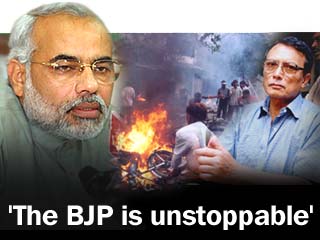
Its finally official.
The ‘fascist, the strongman, the merchant of murder, chhapan chhati Narendra Modi has romped home to victory. That he was going to win was never in doubt, except in the minds of so called experts, who bored us, monopolizing and choking the air waves with their non-stop gibberish in the run up to the result day. The media pundits had got it all wrong the last time they attempted to predict the outcome of Gujarat Assembly elections. And they seem to be making a habit of it predicting spectacular gains for Congress, where none existed, this time around. Modi, the man whom everyone loves to hate: the media, the political parties, and even the majority among his own party notably BJP National President Rajnath Singh, BJP fringe organizations like the RSS, the VHP and the Bajrang Dal, Modi had served humble pie to all his detractors. Rajnath Singh sounded hollow crediting the Gujarat BJP party set up for the victory. It was apparent. Even as Singh lauded the party machinery, the expressions on his face were that of a man who knew that he is dealing with falsehoods.
For it was an out and out Modi show. The Chappan Chhati, the man with his own set of immortals moving about in Modi masks, did not even want any other leader to canvass for him in the state. The likes of Sushma Swaraj and her ilk, adept at polished speech but low on delivery were totally ignored. You must have noticed that none of the BJP star campaigners took part in the electioneering the way they normally do in a BJP state going to elections. Modi, the true follower of Machiavilli had it all figured out. Just take a quick glance at Machiavelli’s political treatise, The Prince, and you will realize the extent to which Modi and his minions were influenced by the work.
With his win, Modi has now set the cat among the BJP pigeons. His credible performance automatically catapults him on to the national stage. Modi, the man of soiled speech, considered a third-rung leaders only a few years back, is now the most recognizable face of the party. God help us!
In the final analysis, these elections were never about development, non-development, Sonia Gandhi’s remarks, the weakness or strengths of Congress (sadly, by fielding BJP dissidents from a number of seats, the Congress once again proved what it is: a party of double standards). Modi won because he had his ears to the ground. The former RSS pracharak never lost his touch with the people, the masses who actually go out and vote. And whenever he felt that leaders from RSS, VHP, or even the BJP were coming in the way, he never lost a moment to show them the door. Despite his background as a rabble rouser and a communalist, he has to be credited for his single-mindedness, his sense of purpose and his conviction to carry it through. And this despite the high flown theories of the idiot-box intelligentsia. Me and you, we heard them talk, day after day. But Modi took no notice of these ‘wise’ men. And he WON!






